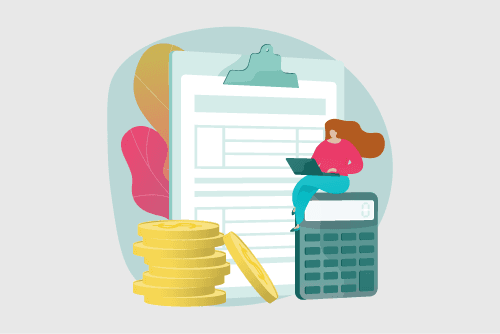Tax Tips for Side Hustles & Small Businesses

Starting your own business – whether it be a side hustle, startup, or long-term self-employment as a sole trader – is full of thrilling projects. There are so many things to plan and do! And then there’s tax, which is arguably less thrilling – yet, left ignored, it has the potential to trip up your best-laid plans.
It’s tempting to put tax in the ‘think about it later’ pile. The end of the tax year, however, rolls around sooner than you think. Imagine the rude shock when you realise you have a fat tax bill to pay. And if you thought individual tax returns were a pain, wait until you try your hand at the business variety. Even if you’re starting up a small, part-time business for some extra cash, it’s worth learning the basics as early as possible so you can set aside money as it comes in – and claim as many deductions as possible, of course.
We all need a bit of extra help when it comes to tackling tax for the first time. Luckily, Roland Blazevic, Superannuation Manager and Financial Planner at Suttie Financial Group, is here to help. With 30 years of experience in the finance industry and a background in accounting, Roland answers your most common questions and makes murky tax mysteries clear.
What should people know about taxes before starting a side business?
Generally, most people start their business under their own name. If they are serious about starting a business they would apply for an ABN in their own name, as well as opening a separate bank account. If an individual earns a full-time salary of say $60,000, and earn a business net profit of say $20,000, the tax rate on their business net profit is 34.5%, resulting in a tax payable of $6,900. If it’s your first year in business all that tax would be payable in one hit.
Can you earn money from a hobby without paying tax?
It depends on a few different factors. Generally, net income derived from a hobby is not considered taxable. It is only taxable if the ATO considers your activity to be actually running a business. There is some good information on the ATO website, however, it is not black and white. Some characteristics of running a business include:
A hobby generally doesn’t include any of the abovementioned characteristics.
How much money can you make on the side before paying taxes?
Assuming your side activity is considered a business in the eyes of the ATO, then your net income would be taxable. The amount of tax payable is dependent on the amount of net income you make from your activity (gross income less expenses), as well as what other taxable income you may have – for example, Salary and Wage income, interest income and any other investment income. In the scenario that your only income is your Net Business Income, and you have no other taxable income, then you can earn up to $21,885 without paying any income tax.
In most cases, If you have salary and wage income, you most likely will be paying tax from the first $ of net income, assuming your salary and wage income exceeds $21,885.
Can you earn money from a hobby without paying tax?
Assuming your side activity is considered a business in the eyes of the ATO, then your net income would be taxable. The amount of tax payable is dependent on the amount of net income you make from your activity (gross income less expenses), as well as what other taxable income you may have – for example, Salary and Wage income, interest income and any other investment income. In the scenario that your only income is your Net Business Income, and you have no other taxable income, then you can earn up to $21,885 without paying any income tax.
In most cases, If you have salary and wage income, you most likely will be paying tax from the first $ of net income., assuming your salary and wage income exceeds $21,885.
What is the biggest mistake that sole traders and self-employed people make when it comes to managing their finances – especially in relation to tax?
In my experience, it would be not keeping good accounting records. If you are serious about becoming a business owner, and the business is run in your personal name, the first step is to apply for an ABN, and then secondly open a separate bank account which is only used to deposit business income and pay business expenses from.
What are some common deductions for self-employed people? Are there any that often get overlooked?
It depends on what type of business you operate. Generally, for a service type business run from home, you can look to claim home office expenses, as well as travel between jobs, and tools of your trade. For a business selling goods, the main expense is the cost of goods and materials you are selling.
Home office expenses can often be overlooked. If travel is a significant part of your business, you will need to determine how to claim your motor vehicle expenses – the 2 basic methods are keeping a logbook, which involves claiming a business percentage of your car expenses. The alternative method is the cents per kilometre method, which involves keeping a diary of your business travel. It should be noted that under this method, the maximum claim for a full year is 5,000 kilometres. If your motor vehicle usage is significant, the logbook method would generally provide a greater tax deduction.
How does the tax-free threshold work with a second job or business?
For a business, it has been more or less already covered. After your first year of business, presuming you are making a profit and paying tax, you will most likely be on the PAYG system. Which means you pay income tax on your business income each quarter.
For a second job, you are unable to claim the tax-free threshold which means the PAYG Withholding tax deducted from your pay is at a higher rate compared to your main job.
The lodgment of your tax return balances the income tax for the financial year in question. If you have paid enough PAYG Withholding tax and/or PAYG Instalments, you will pay income tax after lodging your income tax return to make up the shortfall. On the other side of the equation, if you have paid too much during the year, you can expect to receive a tax refund after lodging your income tax return.
If I were going to start a side business, and you could only give me one piece of advice, what would it be?
To be conservative and not to quit your day job. It is very tough but a new business starting out makes losses in the first year or so, You still need to continue living and pay all regular living expenses such as your mortgage payments (or rent), groceries, power and gas, and all the necessities. You still need some income to pay for your necessary expenses.
Now that you have your tax basics squared away, you can start out the smart way and avoid unwelcome surprises later on. What’s next for your side hustle? A small business course can help you sharpen your skills for scaling up.
Your Guide to the Best Side Hustles in Australia: Make an Extra $1000 a Month
Keen to join the millions of people running a side hustle? Here are the best ideas for starting your side job, reviewed – so you can find out which is the best choice for you.



